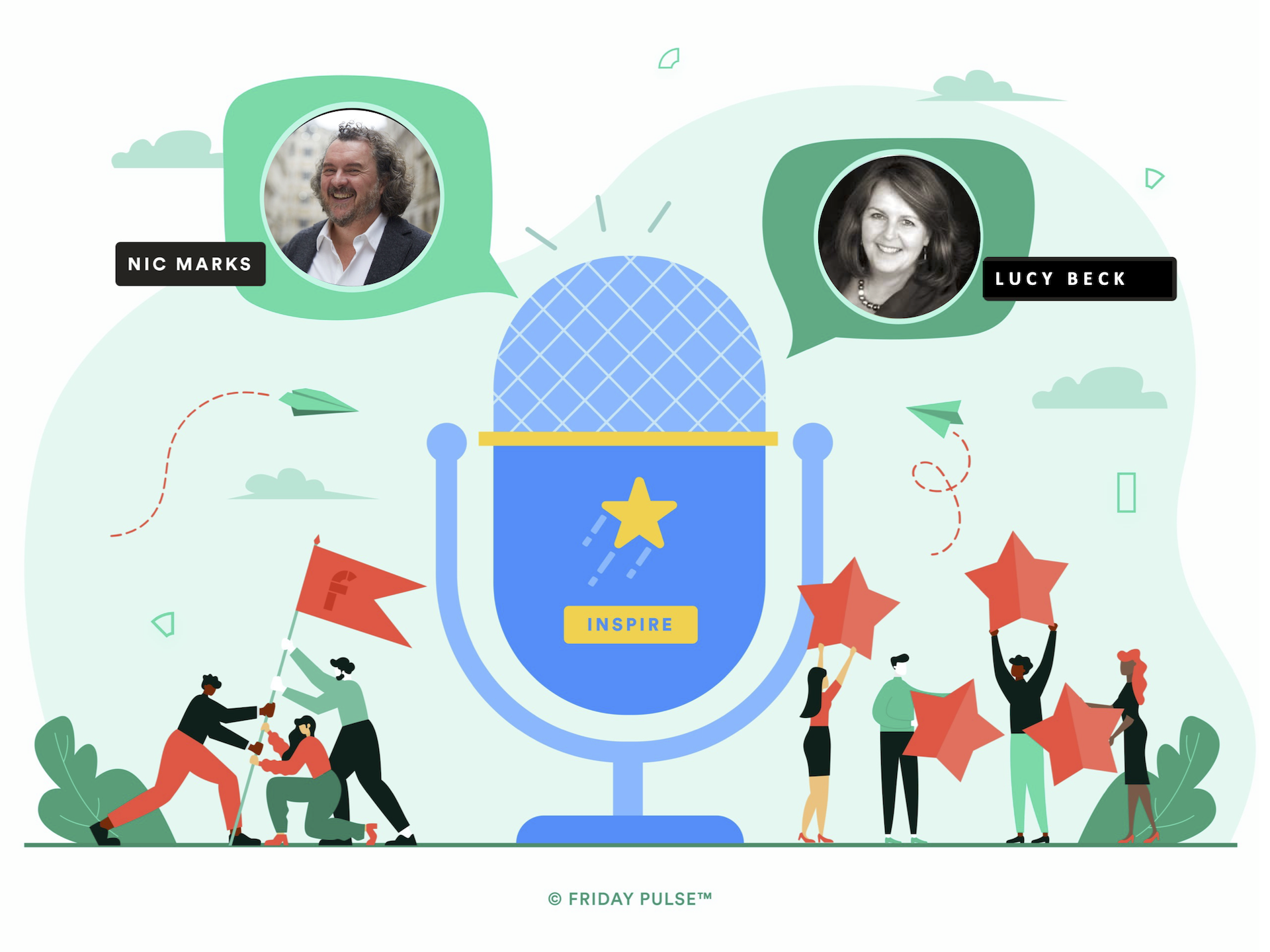Nic:
You’ve been a client for a few months now, I’d love to know why you, as CEO, decided to use Friday Pulse?
Lucy:
Being a small, but global, enterprise in a provincial city like Salisbury, it's quite difficult to get staff, especially young staff in the tech industry. They mainly want to be in bigger more exciting cities. Most of employees are under the age of 30 with many joining us straight from university. So, we have learned over the years that the most important thing for attracting them is our culture and making A2Z Cloud a great place to work.
This was brought home to me last year when we had a difficult incident at work, and I realised we were failing in this regard. In response we had some turnover of staff and then things improved massively thanks to our Head of Operations, Sonia. Afterwards, I wanted to make sure that it just became routine. that we understood how people were feeling. Because it's quite difficult if I go and ask a young employee, are they happy in their job? I absolutely can't do that and expect an honest answer, as I believe most people wouldn’t have the confidence to tell their CEO that, however much we strive for openness, transparency, and psychological trust. So, when I met you, Nic, I was really interested in what you're doing.
Plus, I am a big fan of Verne Harnish (author of Scaling Up) and his number one step is people and keeping people happy. So, I was really interested in what you are doing, and I wanted to trial it.
Nic:
How are you getting on with it?
Lucy:
I really like how now that we have been doing it for a few months it's become routine, and people are doing it every week. To be honest, at the beginning I think people were a little bit distrustful about how anonymous it was. I know you explain in the set-up, but I think there's people who don't quite believe it. They think their manager will be able to see their results - so we've really worked on that. But what’s great is it really makes people think about what has gone well this week, not just what's happened in the last 24 hours.
I also love the way that it focuses on the positive and it encourages people to thank each other. We do already have an instant messaging service. It’s called Cliq and is part of the Zoho suite of software that we specialise in supporting our clients with. We have an appreciation channel, which our team do use, but it is more ‘in the moment’. Whereas I really like the way Friday Pulse encourages people to take time at the end of the week to reflect on how their colleagues have supported them. It makes you think on a different level. So that’s what I really enjoying about using it. I love reading the feedback on a Monday evening, of everything that’s gone well, or not so well. It’s interesting seeing the patterns when multiple people have referenced a specific event.
Nic:
How well have your teams been using it?
Lucy:
Well, I really took on board your point that it’s good to reward participation rather than reward scores.
Nic:
Yes, as you want to know when things aren’t going well, so rewarding high scores would undermine that.
Lucy:
Yes. So, we've actually sent an email saying that if we get over 85% participation, we will have pizzas on Tuesdays. This week we hit 96% and I had to buy a lot of pizza! But it just goes to prove the point, doesn't it?
Nic:
That’s a great idea! Tell me before you started, what were you most sceptical about Friday Pulse?
Lucy:
A couple of things. The first was around the word ‘happiness’ and about measuring it. I think the word ‘happy’ I was a little concerned about. Then when I thought about measuring it, I would go back to David Cameron and his thing about measuring happiness and a bit of me thinks “really?!”. But it's not until you actually look at it in the context of your own business that you realise, it’s a really valid concern.
Then I wasn’t sure that the team would consistently use it, because, as a CEO, it is the trend that you're wanting to see. Are things ok or has something gone wrong?
Then it’s good how you see things are broken down by team. Teams is something we have explored a lot over the two years as a result of the pandemic. We’ve been thinking about different ways of structuring the company. We have been the conventional hierarchical structure with team leaders. I looked into Holocracy which is pretty radical and then some of my team interviewed some guys from an engineering company that have something they call “responsible autonomy”. Their idea was that everyone becomes a business in their own right, but we never made that work as it was too complex.
It's probably something in between we are looking for – a hub-and-spoke sort of structure. We’re actively working on this at the moment and using some of Verne Harnish’s ideas to help us. I think at the moment we have to be fluid as we’re a growing entrepreneurial company.
Nic:
I’m very interested in how businesses are approaching new hybrid ways of working. What are you doing at A2Z Cloud and is Friday Pulse helping?
Lucy:
The whole remote vs office vs hybrid has been really challenging for the business. As with many others, as society began to open up again, we had a real mix of people- some never want to come to the office again, some can’t wait to be back in the office, and some who want a mix. I tried to tackle it with a long-term view around the gig economy, digital nomads, macro external factors such as rising cost of living, and a genuine belief in work life balance. I personally have always hated commuting to an office with a passion and worked remotely for about 12 years before starting the company.
In the end we had a meeting for all the UK based staff, with an open discussion about the pros and cons of the various approaches and put some ground rules in place. Net result we have settled on hybrid. We now have Team Tuesdays. We started off having mandatory Mondays, but around about that time we also started using Friday Pulse and decided that mandatory wasn't a positive word! And to be honest nobody wants to travel into work on a Monday. Probably not even me!
As a CEO I did harbour concerns that people wouldn’t start work until 11am on Monday and would clock off at 3 on Friday, but in reality, we haven’t seen much evidence of that. But I've definitely struggled with not seeing the team because I just want to be able to dip in and talk to people about what's happening. So that’s been much harder to do. No staircase or coffee machine convos!!
So, we decided to have one day where everyone comes in even if you live in London or Bristol for example. It works, and because everybody's catching up with everybody else it’s become a very special social day. I don’t know what productivity is like on that day as we don't measure productivity down to the particular day, but we have lunch and learns plus lots of sharing. Certainly, the atmosphere is great and there is loads of collaboration going on.
Then on a voluntary basis, sometimes a semi voluntary basis, we've got people coming in on Wednesday as well. Most of the management team come in more frequently – we believe in leading from the front. Anybody who wants to come in more frequently can come in whenever they like. The reality is most of the team don't live in Salisbury, so they choose not to. Especially now, with rising fuel costs, train strikes etc a lot of people are really grateful about not to travel as much. So, our hybrid approach means that Tuesdays and Wednesdays are the most regular in-person days.
Nic:
That’s interesting, my thinking about hybrid is that it adds an extra layer of complexity to how we work. What are you noticing?
Lucy:
I know – it’s great for our business – impossible to manage without technology :)
It’s true that remote and hybrid working has changed the landscape for the senior management team and team leaders. It’s much harder to make arrangements for routine conversations (formal 1-2- 1s and catch-ups) along with accessibility to and visibility of employees. But on the upside, we have got much braver about expanding our international team. We don’t outsource – we have full time permanent remote employees. We have 4 people in India, one in Brazil and are exploring the possibility of an Eastern European team.
It’s also much easier for people to hide! The other thing that we have noticed, because a lot of our staff are young, is mental health. The last two years have been especially hard on them, and I worry that if something goes wrong, they will hide away and working remotely makes it harder to notice.
I actually really think about the team, especially those just starting out. It’s not easy at the moment being young. I remember how much I loved my first job. I was there for six years selling Apple Macs. It was a very exciting time as Steve Jobs brought John Sculley into Apple and it was brilliant. It was you versus the world. It's a bit like how you remember your favourite school teachers, you remember the people who influenced and inspired you. Now I worry that if the young don't go into the office, how are they going to get that. Many of them live in houses of multiple occupancy, so their desk is in their bedroom. If they're working from home, they get no break. How do you meet other people? Especially if you’re somebody who's a bit shy. So, it’s tough.
As a responsible employer we are acutely aware of the duty of care to our staff. We have a legal obligation to protect your employees’ health and safety and should not do anything which places them at risk or harm. Is expecting them to work from home where their office is their bedroom causing issues? Are we legally responsible if something goes wrong? There is precious little guidance on these types of issues as working life modus operandi changes.
Nic:
Yes, and all the data shows that young people’s wellbeing has been really knocked by the pandemic. So, it is definitely something to watch out with hybrid and remote working.
But overall, what are you thinking about hybrid?
Lucy:
On the one hand, hybrid is good because it makes you be very objective about the work that people are doing and their participation. But on the other hand, it's harder to integrate them into our culture and our business systems. So yes, it's hard work. But, for me, at the moment, that's a bit of a benefit. Because we've never really structured our onboarding properly before and we have to probably be a bit more blue-chip about it.
I think it’s fair to say the UK pre-pandemic, the UK had a culture of “if you are not at your desk you are not working”. Hybrid working forces you to think long and hard about how you will measure the success of an employee in a given role. A person may be completing tasks when working from home at the rate of knots, but if that’s at the expense of team engagement, participation in group discussions and team leader responsibilities, the result may not be entirely positive. The challenge is in developing techniques for objectively measuring performance and identifying any issues quickly.
Nic:
*Yes, everything's more intentional, isn't it? *
Lucy:
Yes, and that’s not a bad thing. I think it is harder for people who are command-and-control type leaders. I don't think I am a command-and-control type leader, but I did like being able to see people every day. So that has been hard. I really had to counsel myself, and as a CEO, I have had to learn to delegate more to other people. Which I actually think is good for me and good for the business. And Friday Pulse is really helping us, which is why I want to build an integration to the Zoho People Platform so we can promote it to our clients too, as I think it will help them scale their businesses too. The key to success with Friday Pulse is going to be action on feedback. So, when a team member makes a suggestion or shares an idea, we need to make sure we are picking up on those and keeping the conversation going so that we really can demonstrate we are listening and moving forward.
Nic:
*That’s great, thanks so much Lucy for sharing your experiences with me and we are really looking forward to partnering with you on that project! *



